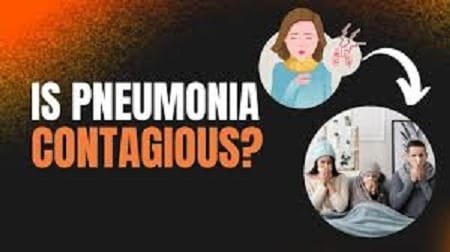Is Pneumonia Contagious? Understanding the Risks and Prevention
Pneumonia is a serious respiratory infection that affects millions of people around the world each year. It can range from mild to life-threatening and is particularly dangerous for young children, the older age people and individuals with weakened immune systems. One common question that arises is whether pneumonia is contagious. This article will explore the nature of pneumonia, its causes, transmission, and effective prevention strategies and also help you the get to know about Is Pneumonia Contagious?
What is Pneumonia?
Pneumonia is an inflammation of the air sacs in one or both lungs, which may fill with fluid or pus, causing symptoms such as cough, fever, chills, and difficulty breathing. It can be caused by various pathogens, including bacteria, viruses, and fungi.
Types of Pneumonia
- Bacterial Pneumonia: The most common type, often caused by Streptococcus pneumoniae.
- Viral Pneumonia: Often occurs as a complication of influenza or other viral infections.
- Fungal Pneumonia: Less common and typically affects individuals with weakened immune systems.
- Aspiration Pneumonia: Results from inhaling food, liquid, or vomit into the lungs.
Is Pneumonia Contagious?
The question of whether pneumonia is contagious largely depends on its underlying cause.
Bacterial and Viral Pneumonia
Both bacterial and viral pneumonias can be contagious, as they are usually spread through respiratory droplets when an infected person coughs, sneezes, or talks. Close contact with an infected person or touching surfaces contaminated with the pathogens can also lead to transmission.
How Contagion Occurs:
- Direct Transmission: Breathing in droplets expelled by an infected person.
- Indirect Transmission: Touching contaminated surfaces and then touching the mouth, nose, or eyes.
Fungal Pneumonia
Fungal pneumonia is generally not contagious. It usually occurs due to inhaling spores from the environment, particularly among individuals with compromised immune systems.
Summary of Contagiousness
- Contagious: Bacterial pneumonia, viral pneumonia.
- Not Contagious: Fungal pneumonia.
Risk Factors for Contracting Pneumonia
Understanding the risk factors can help in preventing pneumonia and its spread.
- Age: Children under 2 years and adults over 65 are at higher risk.
- Chronic Health Conditions: Conditions like asthma, COPD, diabetes, and heart disease increase susceptibility.
- Weakened Immune System: Individuals with weakened immune systems due to conditions or medications are more prone to infections.
- Smoking: Damages lung tissue and increases the risk of respiratory infections.
- Living in Crowded Conditions: Increased exposure to pathogens.
Symptoms of Pneumonia
Recognizing the symptoms of pneumonia is crucial for early diagnosis and treatment. Common symptoms include:
- Persistent cough, often with mucus or phlegm
- Fever and chills
- Shortness of breath
- Chest pain, especially when breathing deeply or coughing
- Fatigue or weakness
If you or someone you know exhibits these symptoms, it is essential to seek medical attention promptly.
How to Prevent Pneumonia
While it may not be entirely possible to eliminate the risk of pneumonia, several preventive measures can be taken:
1. Vaccination
Vaccines can significantly reduce the risk of pneumonia caused by certain bacteria and viruses.
- Pneumococcal Vaccine: Protects against bacterial pneumonia caused by Streptococcus pneumoniae.
- Flu Vaccine: Reduces the risk of pneumonia resulting from influenza.
- COVID-19 Vaccine: Helps prevent viral pneumonia linked to COVID-19.
2. Practice Good Hygiene
- Wash Hands Frequently: Use soap and water or hand sanitizer to reduce the risk of infection.
- Avoid Close Contact: Stay away from individuals showing symptoms of respiratory infections.
- Cover Coughs and Sneezes: Use a tissue or your elbow to prevent the spread of droplets.
3. Maintain a Healthy Lifestyle
- Eat a Balanced Diet: Nutrient-rich foods support the immune system.
- Stay Hydrated: Drinking plenty of fluids helps keep your respiratory system healthy.
- Exercise Regularly: Regular physical activity strengthens the immune system.
4. Avoid Smoking and Pollutants
Smoking and exposure to air pollutants can damage lung tissue and increase the risk of respiratory infections. Quitting smoking and minimizing exposure to secondhand smoke and environmental pollutants are essential steps in prevention.
5. Regular Health Check-Ups
Regular visits to your healthcare provider can help monitor and manage chronic conditions, reducing the risk of pneumonia.
When to Seek Medical Help
If you or someone you know exhibits symptoms of pneumonia, especially in high-risk groups, it’s crucial to seek medical attention. Early intervention can lead to better outcomes and reduce the risk of complications.
Conclusion
While pneumonia can be contagious, understanding its transmission, symptoms, and prevention methods can significantly reduce the risk of infection. By following good hygiene practices, staying vaccinated, and maintaining a healthy lifestyle, individuals can protect themselves and their communities from pneumonia. If symptoms arise, don’t hesitate to consult a healthcare professional for guidance and treatment.
Important FAQs
1. Can you catch pneumonia from someone who has it? Yes, bacterial and viral pneumonias can be contagious and spread through respiratory droplets.
2. Is pneumonia the same as bronchitis? No, pneumonia is an infection of the lungs, while bronchitis is an inflammation of the bronchial tubes. Both can cause coughing and difficulty breathing, but they are different conditions.
3. Can you get pneumonia after the flu? Yes, pneumonia can develop as a complication of influenza, especially in individuals with weakened immune systems.
4. How long does pneumonia last? The duration of pneumonia can vary based on the individual and the cause, but with treatment, most people begin to feel better within a few days to weeks.
By understanding the nature of pneumonia and its contagion risks, we can take proactive steps to protect ourselves and those around us from this potentially serious illness.
Thanks for visiting Gymbag4u.com
You may also like our few other articles. https://gymbag4u.com/high-blood-pressure-symptoms-causes-and-remedies/ and https://gymbag4u.com/heart-attack-symptoms-causes-and-remedies/ and https://gymbag4u.com/flu-symptoms-and-remedies-your-essential-guide/ and
